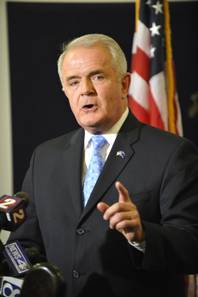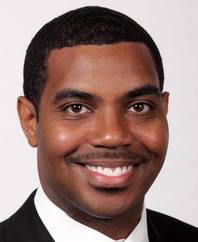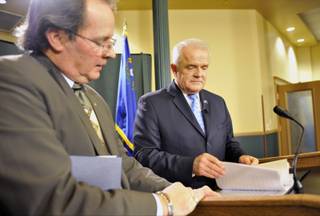Wednesday, Feb. 10, 2010 | 2:01 a.m.

Gov. Jim Gibbons answers questions from reporters after delivering his State of the State speech in the Capitol building in Carson City Monday, Feb., 8, 2010.
Reader poll
State of the State
Gov. Jim Gibbons gave an emergency State of the State address at 6 p.m. Monday, Feb. 8. Video is courtesy KVBC Channel 3.
Sun Archives
- Hundreds rally to protest governor’s proposed budget cuts (2-9-2010)
- Governor sounds like the GOP candidate he is, observers say (2-9-2010)
- The bleeding of education: Gibbons faults ‘whining’ about school funding (2-9-2010)
- Cuts would dramatically shrink Nevada safety net (2-9-2010)
- Gibbons: No battle expected over taxes during special session (2-8-10)
- Governor plans emergency address on Nevada budget (2-7-10)
- Governor’s speech will lay out state’s budget problems (2-7-10)
- State budget comes up $800 million short (1-22-10)
- Forecast: Economy will begin to rebound in mid-2011 (1-22-10)
- Gibbons’ no-talk order further divides branches (1-22-10)
- Special session may require help of state Supreme Court (1-10-10)
Sun Coverage

Steven Horsford
Nevada Democrats, already facing a daunting electoral landscape this year, are in danger of losing their base, including organized labor.
Some members of the liberal wing of the Nevada Democratic Party, including the heads of the teachers union and the powerful Culinary Union, are attacking what they regard as the party’s timidity in the face of massive budget cuts proposed by Gov. Jim Gibbons.
The state faces a short-term deficit of more than $881 million because of the continued recession and a spiking demand for services from the growing ranks of the poor.
Some liberal leaders think Nevada Democrats are adrift and have not offered a strong alternative to Gibbons, the Reno Republican who told educators in his State of the State address to “stop whining” about education funding in a state with one of the lowest per-pupil expenditures in the nation.
State Senate Majority Leader Steven Horsford, in the Democratic response to Gibbons, said new taxes are not on the table to prevent the next round of cuts. He said the state needs a fairer, more stable, more robust tax structure, but not just yet. Democrats have made similar promises for years.
D. Taylor, secretary-treasurer of the Culinary, is close to Horsford because of the senator’s day job as head of the Culinary Training Academy. Still, Taylor took issue with the Democrats’ approach.
“I don’t understand how they expect people to be excited about their opinions until they offer a different policy and vision than the governor and the Republicans,” said Taylor, whose union and its 50,000-plus members are a must-have for Nevada Democrats.
“I think the Democrats in this state need to decide what they stand for. They have to stand for something and they have to pay for it if they want something different,” Taylor said, referring to new taxes.
Lynn Warne, president of 30,000-member teachers union, said her members are underpaid as it is and won’t accede to a pay cut, telling legislators to show “leadership and courage” and raise taxes.
Erin Neff, head of the liberal advocacy group Progress Now Nevada, pointedly didn’t reply to Gibbons’ address. Instead, she attacked Horsford’s response.
She said the base is upset with Democratic leadership.
“I don’t see a strong base right now,” she said. “There’s no energy, no candidates that evoke an energetic response, and this should be a wake-up call on all levels.”
She said Democrats should go with a simple message: “Tax mining, tax Wal-Mart.”
Horsford is on record supporting broad-based tax reform, but said a special session with just two weeks to prepare is not the time to do it. “While I respect very much my friends in the labor community, my focus and that of my colleagues in the Legislature is to address the budget crisis at hand,” he said.
“If those in the labor community agree we need broad-based tax reform, including full participation from banks and other big corporations, I welcome their help building awareness and momentum,” he added.
The Democrats’ play for centrist voters, while in other years a pragmatic strategy, could backfire badly if it alienates their base.
“I wouldn’t be running to the center,” said Michael McDonald, an expert in voter behavior at George Mason University and the Brookings Institution. “You don’t want to be the party of teachers while cutting teacher salaries.”
Off-year elections, meaning an election without a presidential race, tend to be lower-turnout affairs, with fewer moderate and undecided voters. These off-year elections are about motivating the party base, rather than appealing to swing voters, who are less likely to show up.
Indications point to a highly motivated Republican Party, driven by antipathy toward President Barack Obama and Sen. Harry Reid, who is up for re-election, and the energy and excitement of the Tea Party movement, as evidenced by the victory of Scott Brown in the Massachusetts special election.
If Democrats cannot counter this energy by offering an alternative to the Republican agenda of cutting government at all levels, they face the prospect of losing big.
“You absolutely need your base in a midterm election,” said Thomas Schaller, a political scientist at the University of Maryland, Baltimore County, and writer for the political Web site, fivethirtyeight.com.
It’s not clear, however, that there’s any easy fix for Democrats.
Democrats fear a tax increase would further hurt an already fragile economy. They also note that they do not have the votes to override a Gibbons veto of a tax package — they would be making a tough, but ultimately pointless vote.
Finally, it’s not clear they can even advance a tax package during a special session if Gibbons, who has the constitutional power to set the agenda for special sessions, specifically forbids it.
Assemblywoman Sheila Leslie, D-Reno, one of the Legislature’s most liberal members and a top lieutenant to Assembly Speaker Barbara Buckley, said the philosophical debate about taxes is a worthy one, but complaining about Democrats “is ignoring the political reality.”
“They have to understand the process,” she said of critics. “If there’s no path to two-thirds (to override a Gibbons veto) — and there is no path to two-thirds — you can cry all you want about Democrats not being bolder. You can scream and stamp your feet or work within the political structure to get somewhere.”
Buckley and Assembly Majority Leader John Oceguera have joined Horsford in saying there’s “no appetite” for a tax increase. Democratic leaders fear their candidates will have the tax albatross, long deadly in Nevada politics, hung around their necks.
(Even without a new tax increase, however, Democrats will have to defend taxes — the Legislature, as Gibbons forcefully reminded voters Monday, already raised taxes last year, as many campaign mailers this year will no doubt attest.)
Raising taxes could further alienate unaffiliated voters, who have leaned toward the Republican column in the past year as the economy has muddled along.
Danny Thompson, head of the Nevada AFL-CIO, summed up the problem: “If you could sit everybody down and explain the whole thing and explain what’s broken with our tax structure, we could get the support to fix it,” he said.
As Thompson knows, in politics the side that is explaining is the side that is usually losing. “At the end of the day, I don’t know what you do,” he said.
Dan Hart, a Democratic political consultant to the teachers, said Democrats have erred in not seeing that politics have changed in Nevada, which is home to 83,000 more Democrats than Republicans.
“If you say, ‘We’re going to cut teacher pay and lay off many of them. Or, we’re going to make these larger corporations pay their fair share,’ the public is wildly supportive of the second option,” he said.


Join the Discussion:
Check this out for a full explanation of our conversion to the LiveFyre commenting system and instructions on how to sign up for an account.
Full comments policy